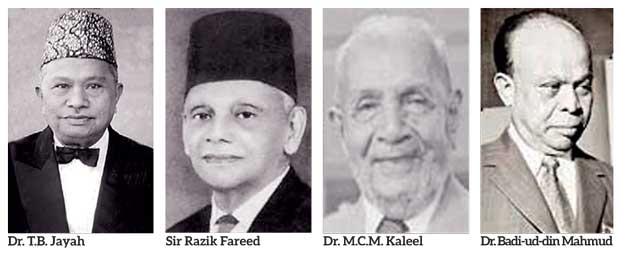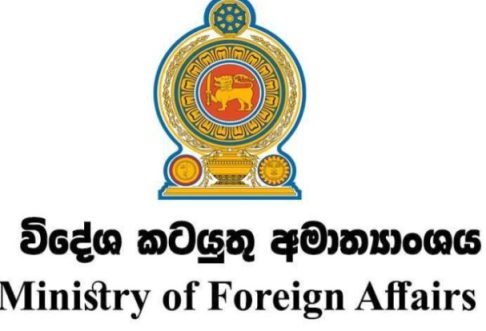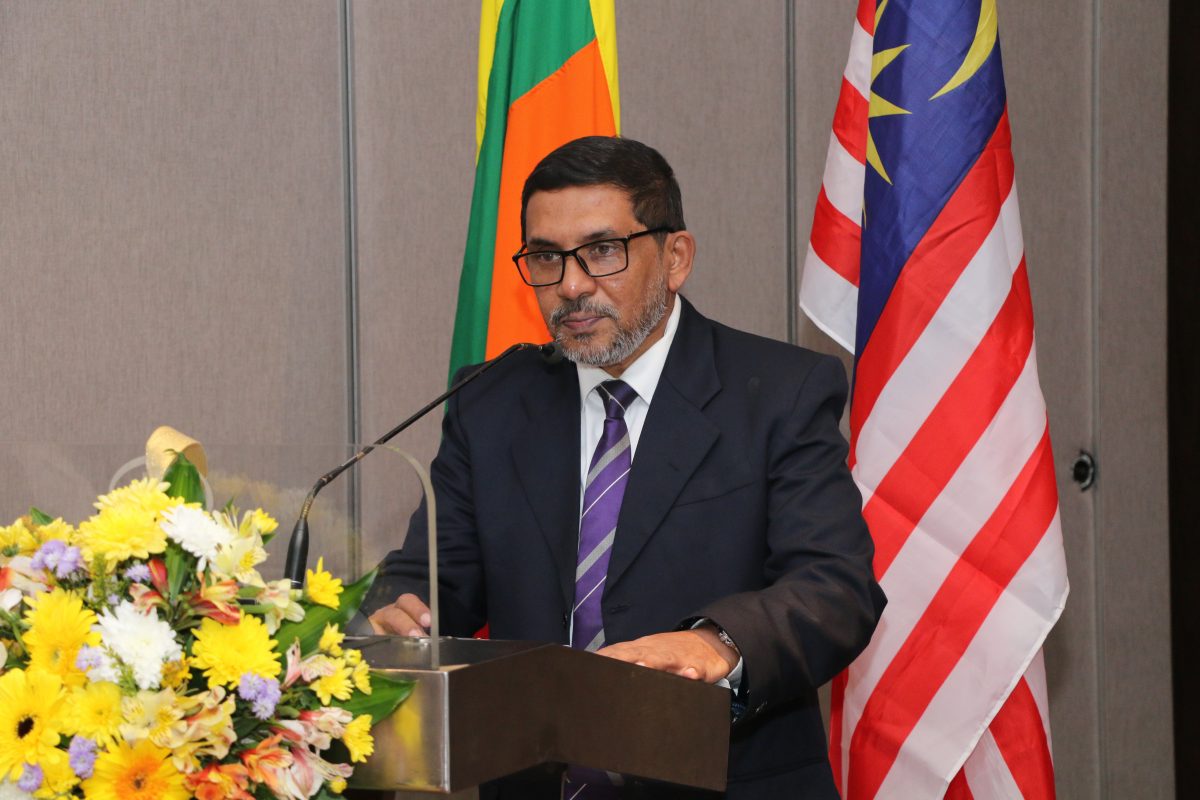The question of the burial or cremation of COVID-19 victims took a bizarre turn to expose a government at odds with itself with Ministers and health authorities sending out mixed messages and contradicting each other.
It was suddenly announced that President Gotabaya Rajapaksa had agreed to the burial of Muslims who died of COVID-19 and instructed health authorities to look for “dry land” for the burials. It was denied by the health authorities immediately. Thereafter apparently burial was allowed but only in a “remote area” in the dry zone to prevent contamination of the groundwater tables. Now it seems it is the health authorities who have to make the final decision.
Adding to the cacophony and exposing the racist element in the saga was Bodu Bala Sena leader Galagodaaththe Gnanasara Thero who claimed that extremist Muslim groups were involved in promoting burials rather than cremations and urged that the people should be told the views of the health sector without being influenced by religion. He claimed that the issue would lead to Islamic radicalisation.
According to the dictates of their faith, Muslims believe that their remains should not be cremated. Burial is the culture and tradition of many people world over. It is allowed and practised in over 180 countries throughout the world even during the pandemic.
Around the world, 52 million cases of COVID-19 have been recorded with 1.2 million deaths. In Sri Lanka, the number of cases as of November 11 was 14,759 with 45 deaths.
In Sri Lanka authorities are stuck with a colonial-era ordinance that makes it mandatory for victims of plagues and contagion to be disposed of soon after death following specific guidelines. The Quarantine and Prevention of Diseases Ordinance permits burial or cremation as modes of disposal. The ordinance also empowers the Minister to make regulations in respect of burial or cremation. The regulations promulgated in terms of the ordinance provided for special procedure to be adopted in disposing bodies for burial or cremation. However, an amendment introduced to these regulations on April 11 by a gazette notification that declared that victims and suspected victims of COVID-19 “shall be cremated”.
The World Health Organisation (WHO) set out the guidelines in dealing with the victims of COVID-19 in March, which specifically provide for both burial and cremation. The guidelines say that at a funeral, relatives may view the body but not touch it. WHO emphasised that the cultural and religious traditions of the dead and their families should be respected. Bodies need not be handed over to relatives but they should be able to see their loved ones before they are taken for cremation or burial.
Sri Lanka is going its own unique way, disregarding WHO guidelines and imposing arbitrary and draconian measures. No COVID-19 victim or suspected victim is permitted to be buried. This denial of burial is deeply distressing to the Muslim community. The decision is not backed by any scientific reason. Cremation has now become the single most fear in the minds of the Muslim community.
Many bodies of Muslims have forcibility been taken from homes to Colombo National Hospital and cremated if they tested positive in the PCR test done on the bodies.
Some families of victims have filed Fundamental Rights applications challenging the regulation mandating cremation only. These applications are yet to be heard because the courts are intermittently closed due to the pandemic.
Until March 30 this year, the Ministry of Health’s website listed burial as a safe option for COVID-19 victims but the death of the first Muslim person on March 29 witnessed a rushed cremation without family members being allowed to see the body. Overnight the Health Ministry removed its guideline that had permitted burial.
The COVID-19 cremation toll among Muslims stands at 21 (two are not included in national COVID-19 causality list) as of November 10. In one case, the PCR test result was negative but that result arrived only after victim was cremated.
Although Muslims constitute about nine per cent of the country’s population, they account for a large number of those who have supposedly died of COVID-19. According to family members, 14 of the 21 bodies ordered to be cremated were of people who had died of regular ailments and mostly at homes but their bodies were taken to the Colombo National Hospital on the order of the health authorities. They tested positive for COVID-19 according to hospital authorities.
Currently many parts in Colombo North and Colombo Central, where Muslims live in densely crowded conditions, are under lockdown. They are generally poor. Government officials in these areas have been instructed to take every body to Colombo National Hospital and put it in the morgue until PCR tests are carried out and results known. If the PCR test result is positive the families are placed in self quarantine or taken to military quarantine facilities. One of the family members has to sign off for the body to be cremated.
COVID-19 positive bodies are sealed in a coffin for which family members have to pay a minimum of Rs. 5,000 and, in most cases only one person is allowed to pray before the body is taken for cremation. Sometimes they are not allowed to see the face of the deceased.
With the second wave of COVID-19 in October, many cremations were ordered by Colombo National Hospital despite some deaths being categorised as sudden deaths by the Health Ministry.
On May 4, Fathima Rinosa, 44, who was receiving treatment for pneumonia at the Colombo National Hospital, was transferred to the Infectious Diseases Hospital (IDH). The following day in the morning the family was told that she had passed away and her body had been cremated. The PCR test result came after her cremation and the death certificate said she had died of “suspected C19”. A government doctor appeared on national television on May 6 and said that Rinosa’s PCR test result was negative. Her family was put in quarantine but brought back next day because they tested negative.
On May 5, Abdul Hameed Rafaideen, 64, who was suffering from several illnesses, died and a private doctor declared that his death was due to bad health. His family was getting ready to bury him when a police officer ordered the body to be taken to the Colombo National Hospital. A PCR test was ordered and his body was cremated as a suspected COVID-19 case but his death was not included in the list of total number of national COVID-19 fatalities. His body was cremated apparently by mistake. His family has filed a fundamental rights petition in the Supreme Court and the case is getting postponed on various grounds without being taken up for hearing.
On October 27, Mohamed Minhaj, 19, who was mentally ill and bedridden from birth and was under his family’s supervision, died in his sleep at home. The doctor, who treated him regularly, cleared the documents for burial but the Grama Sevaka asked the family to obtain police clearance to transport the body to the burial ground because of lockdown. The police rushed to the house and forced the family to take the body to the Colombo National Hospital. The hospital ordered a PCR test and the body was put in the morgue pending the result. Next day the family was told the result was positive and that his body had been cremated. His death is recorded as a sudden COVID-19 death. Family members and relatives who had come to attend the funeral were sent for compulsory military quarantine.
On November 2, Ahamed Jamaldeen Abdul Razeek, 78, was admitted to the Colombo National Hospital with a head injury. He was transferred to the accident ward due to heavy bleeding and later to an isolation ward. He died the following day and his body was kept in the morgue and none of the family members were allowed to see him. Later hospital authorities said his PCR test was positive and cremated his body on November 4without obtaining consent from the family. His death was declared as a sudden COVID-19 death by the Health Ministry spokesperson but later his name was removed from the national COVID-19 casualty list. The document given to the family says his death was due to brain damage caused by head injury. Family members are under house quarantine but none of them have tested positive.
COVID-19 has spread throughout the country despite the government’s persistent denial of community spread. Yet it is only at the Colombo National Hospital that so many Muslims are found after their death to have been COVID-19 infected although their death notices issued after cremation say COVID-19 with other illnesses. The compulsory PCR test on bodies affects mainly poor Muslim families who cannot afford to pay for private health care but rely on the free services available at government hospitals. Many are daily wage earners who cannot even afford to pay for a coffin. Many poor Muslims who are seriously ill are not seeking medical treatment because of the fear of being cremated on false pretexts.
The gazette of April 11 making cremation the only option should be rescinded and the government should follow WHO guidelines for safe burial. More than 180 countries have allowed burial on the basis that there was no scientific evidence to substantiate the claim made by some Sri Lankan professionals that COVID-19 could spread through buried bodies or contaminate groundwater.
Since the outbreak of the pandemic earlier this year, hundreds of thousands of COVID-19 victims worldwide have been buried and there is no evidence of any adverse impact due to the burials. It is therefore only logical and humane to allow the Muslim community and others who wish to bury their dead according to their cultural and religious beliefs and practices to do so.
Post Disclaimer | Support Us
Support Us
The sailanmuslim.com web site entirely supported by individual donors and well wishers. If you regularly visit this site and wish to show your appreciation, or if you wish to see further development of sailanmuslim.com, please donate us
IMPORTANT : All content hosted on sailanmuslim.com is solely for non-commercial purposes and with the permission of original copyright holders. Any other use of the hosted content, such as for financial gain, requires express approval from the copyright owners.
 Sri lanka Muslims Web Portal Sri Lanka Muslims News Center
Sri lanka Muslims Web Portal Sri Lanka Muslims News Center
 Donate
Donate


